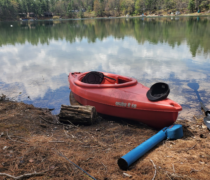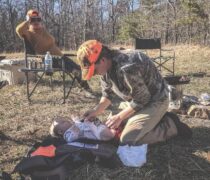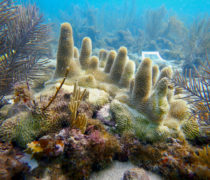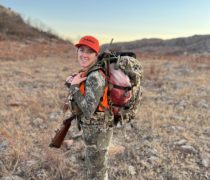Antiquities Act Anniversary – Celebrating Shared Values
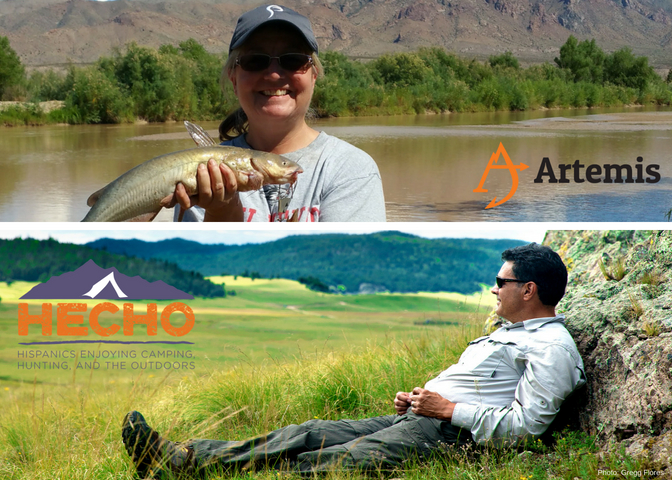
Artemis sportswomen are all about cutting fresh tracks for conservation. Sometimes that means getting women together to grow their knowledge about hunting and fishing or train sportswomen to turn their passion into action. Sometimes it means having important conversations about the shared values that bring diverse public lands users to our treasured places.
This month marks the 112th anniversary of the Antiquities Act, one of the most successful vehicles for protecting public lands. The landmark conservation law allows us to protect places of cultural and historical significance, preserving spaces and places important to our shared American heritage. We recently had a great conversation with Christine Gonzales of Artemis Sportswomen and Max Trujillo of HECHO, two public land advocates from New Mexico. They each talked about how they came to love the outdoors and why they cherish public lands so much.
Check out Christine’s story and then head over to HECHO and read Max’s story. It’s pretty cool to learn about how different experiences lead to shared love for and deep connection to our public lands. And remember, it’s never too late to learn to hunt and fish – see you outside.
~ Marcia
Christine, you mentioned you did not become an active outdoors woman until you were in your thirties, what activities got you hooked?
It’s a journey: From learning to put a worm on a hook to becoming hunter-ed instructor.
Christine: I had a friend that was getting ready for a bow hunt and his vehicle had broken down and I had a truck at the time and he asked if he could borrow it. I said yes on one condition, which was that I get to tag along on the hunt. Now you’re talking to somebody who was a total rookie that didn’t know anything about being out in the woods except for collecting firewood and picking piñon. So that was my first exposure to hunting and then shortly after that another friend of mine called me up and invited me to go fishing with him and it was in October or November, and I’m thinking, yeah, I’ll learn, but you’re going to have to teach me because I don’t remember how. I thought we’d be going in the spring. He said, “No, I’m talking about this weekend.” Off we went to the Jemez and he taught me how to fish like a child. He’d bait the hook for me, actually cast it for me and some cases if he would catch the fish hook, passed me the line and then I’d reel it in and I quickly realized that I liked it but I didn’t like being dependent on somebody. I asked him to teach me how to tie a knot and I learned quickly. I soon became proficient at spinning rod fishing and now I’m fly fishing and I’m tying my own flies.
There was another group of guys that I hang out with that have really mentored me and my exposure to hunting. They had me scout for elk during muzzle loader season. And I’m looking out at all this public land and then I see the herd and radio back to my friend the location. The next thing I know, I hear a blast. And I get this little sinking and feeling in my stomach I thought to myself, oh my God, I think he might’ve gotten one and it’s my fault.
I still thought that animals were cute and fuzzy and that you shouldn’t hurt him even though I knew where grocery store meat came from, but seeing a live animal is a total different situation. So the next step was processing the elk and my friends were afraid I might faint and from the sight of blood or they didn’t know how I was going to react. Well, I wanted to know what it felt like to handle the meat because I saw that animal on the ground and thought that I might not get this opportunity again, so I want to know what it feels like. When you come from getting your meat from the grocery store and it’s cold, well I didn’t realize that this animal still warm. I stick my hands in and I grabbed a piece of meat and I looked at it and felt it and I thought it looks like what you can get grocery store. After that I kept on hunting, starting with small game like rabbit and squirrels and then progressing onto big game. Now, I’m a hunter-ed instructor in both archery and firearm. I’ve just embraced the whole process.
Why are public lands important to you and also what is your hope for the future of our public lands?
Public lands are for all of us.
Christine: Public lands are important because of accessibility for the general public. I can’t afford to purchase landowner hunts, it’s just too pricey. It’s pricey enough to just go on a hunt which many people don’t realize the cost of and the preparation and all that that entails. It’s important to maintain accessibility to public lands where you can hunt free range animals, whether it’s elk or grouse or turkey. My hope for the future is that public lands stay in public hands and that more people become invested and involved because I think people think that public lands means accessibility for hunters and that’s where people are mistaken. Public lands are for people who want to take a scenic drive, wildlife viewing, hiking or just having a picnic and public lands. It’d be a shame for people to realize that they’re being left out of voicing their opinion on public lands.
What’s the danger in rescinding the Antiquities Act and other public lands protection?
To start with: History. Diversity. Untouched Landscapes.
Max: The danger to me is that the attempt to roll back protections is also an attempt to erase a part of history that’s really important to the fabric of the United States. A lot of the protections via the antiquities act have come to places that are ethnically diverse and having to do with a history that isn’t part of the history that is taught in most of our schools. And by rolling back of the Antiquities Act we could erase an extremely important part of the history of the western United States.
Christine: I agree with Max and would add that rolling back protections could open up those landscapes to industrial drilling of oil and gas and minerals and other natural resources. We could see a huge great impact to the landscape if these rollbacks are allowed to happen.
To read more, including more from Max, please visit HECHO.



